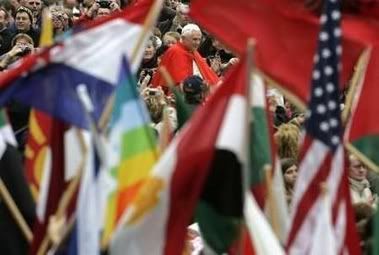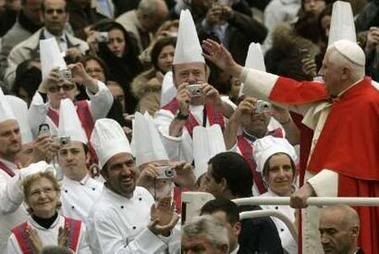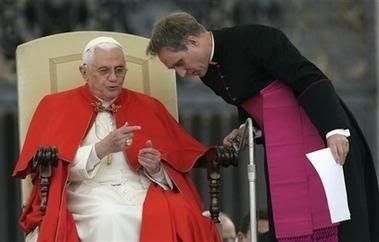
From Vatican Square at Today's Wednesday Audience
Of course not all the Church Fathers were "white". Many were not of course(trying to market the title thread). Today the Pope is again talking to us(All One billion of us not just the people in Vatican Square) during his Wednesday Audience about the Church Fathers. Today is part II on Saint Jerome. If you wish to read what he said last week go see The Pope Speaks_-Pics and Translation From Today's Wednesday Audience-Pope Talks St Jerome and the Bible .
I think it is a good idea to step back and ponder why the Pope is spending so much time in his publc audiences talking about these people. In a foreword to a book on the Church fathers I read some time back ,I was struck by an observation as to Vatican II. The view was back when that great Council was happening that the council would be followed by a great rebirth of study and living the thought of the Church Fathers. When we hear hear that Vatican II was for "getting back to the "basics" , it should be noted that the Church Fathers were a suppose to be a important part of the mix. . Well it didn''t happen. The author stated untill it does the true fruits of Vatican II would not happen. I agree.
Yesterday I posted More On the Pope's Incredible Letter on St. John Chrysostom . In that letter(which can found at the link) the Pope said:
"Therefore, what greater wish could I express to theologians than for their renewed commitment to recover the sapiential patrimony of the Holy Fathers? It cannot but produce a precious enrichment for their reflection, even on the problems of our times".
Now the Holy Father is not only wanting the Church Fathers to be the domain of "theologians". IF that were the case he would not be spending basically over a year on this topic to his main weekly address to over 1 billion Catholics. I suspect the Pope agrees that for the "true fruits" of Vatican II to be realized the average joe Catholic must aquaint himself again with this great Patrimony.
That being said lets move on to today Thanks again to the Ratzinger Forum for the quick translation and the great pics(more there) from today's Wednesday Audience and the great pics. I am putting more pics up today tha I usually do because this selection is so good.

Pope Benedict talks to relatives of the victims of a bomb attack against Italian forces in Nassiriya, Iraq four years ago, at the end of today's general audience.
Here is a translation of the Holy Father's catechesis at St. Peter's Square today.
Dear brothers and sisters!
We will turn our attention today to St. Jerome, a Father of the Church, who placed the Bible at the center of his life: he translated it to Latin, he commented on it in various works, and above all, set out to live it concretely in his long earthly existence, notwithstanding the difficult and fiery nature for which he was also known. Jerome was born in Stridone around 347 to a Christian family, who assured him of a thorough education, even sending him to Rome to complete his studies. As a young man, he felt the attractions of worldly living (cfr Ep. 22,7), but his desire for and interest in the Christian religion prevailed. Baptized around 366, he was drawn to the monastic life, and going to Aquileia, he joined a group of fervent Christians, whom he described as almost 'a choir of the blessed' (Chron. ad amm. 374), who had gathered around the bishop Valerian. Later, he left for the Orient and lived as a hermit in the desert of Calcide, south of Aleppo (cfr Ep. 14,10),dedicating himself to serious study.
He perfected his knowledge of Greek, he began to study Hebrew (cfr Ep. 125,12), transcribed patristic codices and works (cfr Ep. 5,2), and became vividly aware of the contrast between pagan mentality and Christian living - a contrast made famous by the dramatic and vivid 'vision' which he recounted, in which he was flagellated in the presence of God because he was 'Ciceronian and not Christian' (cfr Ep. 22,30). In 382, he moved to Rome where Pope Damasus, recognizing his fame as an ascetic and his competence as a scholar, took him on as secretary and adviser. He encouraged him to undertake a new Latin translation of Biblical texts for pastoral and cultural motives. Some members of the Roman aristocracy, above all, noblewomen like Paola, Macella, Asella, Lea and others, who - desiring to commit themselves to the way of Christian perfection and to deepen their knowledge of the Word of God - chose him to be their spiritual guide and teacher in the methodical approach to sacred texts, for which these noblewomen learned Greek and Hebrew themselves.
After the death of Pope Damasus, Jerome left Rome in 385 and undertook a pilgrimage, first to the Holy Land, then to Egypt, a destination chosen by many monks (cfr Contra Rufinum, 3,22; Ep. 108,6-14). In 386, he returned to Bethlehem, where the generous patronage of Paola had resulted in the construction of a monastery for males and another for females, as well as a hospice for pilgrims to the Holy Land 'in memory of Mary and Joseph who found no room to stay' (Ep. 108,14). He was to remain in Bethlehem until his death, carrying on his intense activity. He commented on the Gospels; he defended the faith, vigorously opposing various heresies; he exhorted monks to perfection; he taught classical and Christian culture to young pupils; he welcomed pilgrims to the Holy Land like a pastor. He died in his cell near the Grotto of the Nativity on September 30, 419/420. His literary preparation and vast erudition allowed Jerome to revise and translate many Biblical texts - an invaluable service to the Latin Church and Western culture. On the basis of original texts in Greek and Hebrew, and cmparing them to earlier translations, he realized the revision of the four Gospels in Latin, then the Psaltery, and a great part of the Old Testament. Taking account of the original Greek and Hebrew texts, of the Septuagint (classic Greek version of the Old Testament dating back to pre-Christian times) and earlier Latin translations, Jerome - with the help of collaborators - could offer a better translation: the so-called 'Vulgate', considered the 'official' text of the Latin Church.

It is interesting to highlight the criteria that the great Biblical scholar used in his work as a translator. He revealed them himself when he stated that he respected even the order of words in Sacred Scripture, because, he said, "even the order of words is a mystery", that is, a revelation. He also reiterated the need to turn to the original texts: "Whenever a question is raised among Latin readers about the New Testament because of discordant readings of the texts, we must turn to the original, that is, the Greek text in which the New Testament was first written. Likewise for the Old Testament, if there are divergences between the Greek and Latin texts, let us turn to the original text in Hebrew. In this way, everything that flows from the spring, we shall also find in its rivulets" (Ep 106,2). Jerome also commented on several Biblical texts. For him, commentaries should offer many opinions "so that the astute reader, after reading different explanations and getting to know different opinions - to accept or to reject - may judge which one is most reliable, and like a currency expert, reject the counterfeit" (Contra Rufinum 1, 16). With energy and liveliness, he refuted the heretics who contested the tradition and faith of the Church. He also showed the importance and validity of Christian literature which was now worthy to confront classical literature. He did this in De viris illustribus, a work in which he presented the biographies of more than a hundred Christian authors. He also wrote biographies of monks, illustrating the monastic ideal alongside other spiritual itineraries, and translated various works by Greek authors. Finally, in the important Epistolary, a masterpiece of Latin literature, Jerome emerged with his most important characteristics as a man of culture, ascetic and spiritual guide. What can we learn from St. Jerome? I think, above all, it is this: to love the Word of God in Sacred Scripture. St. Jerome said, "Not to know Scriptures is not to know Christ." That is why it is important that every Christian live in contact and in personal dialog with the Word of God, given to us in Sacred Scripture.

This dialog should be truly personal, because God speaks to each of us through Sacred Scripture and has a message for each of us. We should read Sacred Scripture not as a word from the past, but as the Word of God addressed even to us, and we must seek to understand what the Lord is telling us. But in order not to fall into individualism, we must also keep in mind that the Word of God is given to us in order to build communion, to unite us in the truth along our way to God. Therefore, the Word of God, while remaining a personal word, is also a word to build community, to build the Church itself. So we should read it in communion with the living Church. The privileged place for reading and listening to the Word of God is the liturgy, in which, by celebrating the Word and rendering the Body of Christ present in the Sacrament, we actualize the Word in our life and make it alive and present among us. We should never forget that the Word of God transcends time. Human opinions come and go. What is very modern today will be old tomorrow. But the Word of God is the word of eternal life, it carries eternity in itself ,and therefore is valid for always. Carrying the Word of God, we carry in us the eternal, life eternal. So I conclude with a statement of St. Jerome to St. Paulinus of Nola, in which the great exegete expresses that fact, that in the Word of God, we receive eternity, life eternal: "Let us seek to learn on earth the truths that will remain valid even in heaven" (Ep. 53,10).

Later, he synthesized the catechesis for English-speaking pilgrims:
Dear Brothers and Sisters,
In our catechesis on the teachers of the early Church, we now turn to Saint Jerome, who was responsible for the Latin version of the Bible known as the Vulgate. Jerome made the Scriptures the centre of his life, translating the inspired word of God, commenting upon its teaching and, above all, striving to live his life in accordance with its precepts. Born in Dalmatia in the middle of the fourth century and educated in Rome, he embraced the ascetic life and devoted himself to the study of Hebrew and Greek.
After a sojourn in the East, he returned to Rome as secretary to Pope Damasus, who encouraged him in his work of translation. He then retired to the Holy Land, where he founded monasteries and a hospice for pilgrims in Bethlehem. Jerome’s entire life, his vast erudition and the spiritual wisdom born of his ascetic lifestyle were devoted to the service of God’s word, the refutation of heresy and the encouragement of Christian culture
Let us take to heart the words which this great master of the spiritual life once addressed to Saint Paulinus of Nola, and "seek to learn on earth those truths which will remain ever valid in heaven".
I am pleased to greet the English-speaking visitors present at today’s Audience, especially those from England, Ireland, Denmark, Sri Lanka, the Philippines and the United States. My special greeting goes to the members of the pilgrimage group from the Diocese of Rockville Centre, led by their Bishop. I also thank the orchestral and choral groups for their uplifting music. Upon all of you
I cordially invoke an abundance of joy and peace in our Lord Jesus Christ.


No comments:
Post a Comment